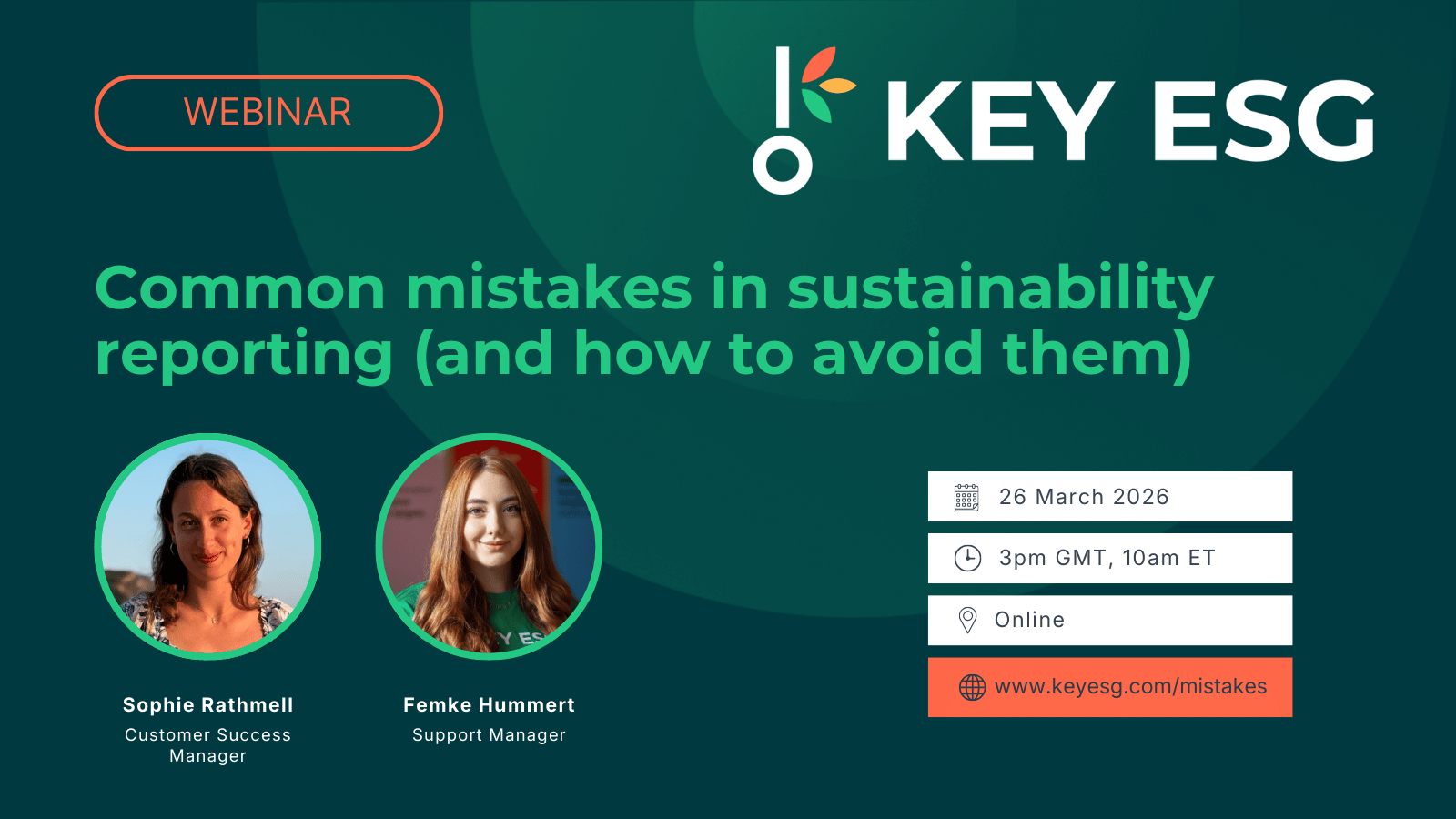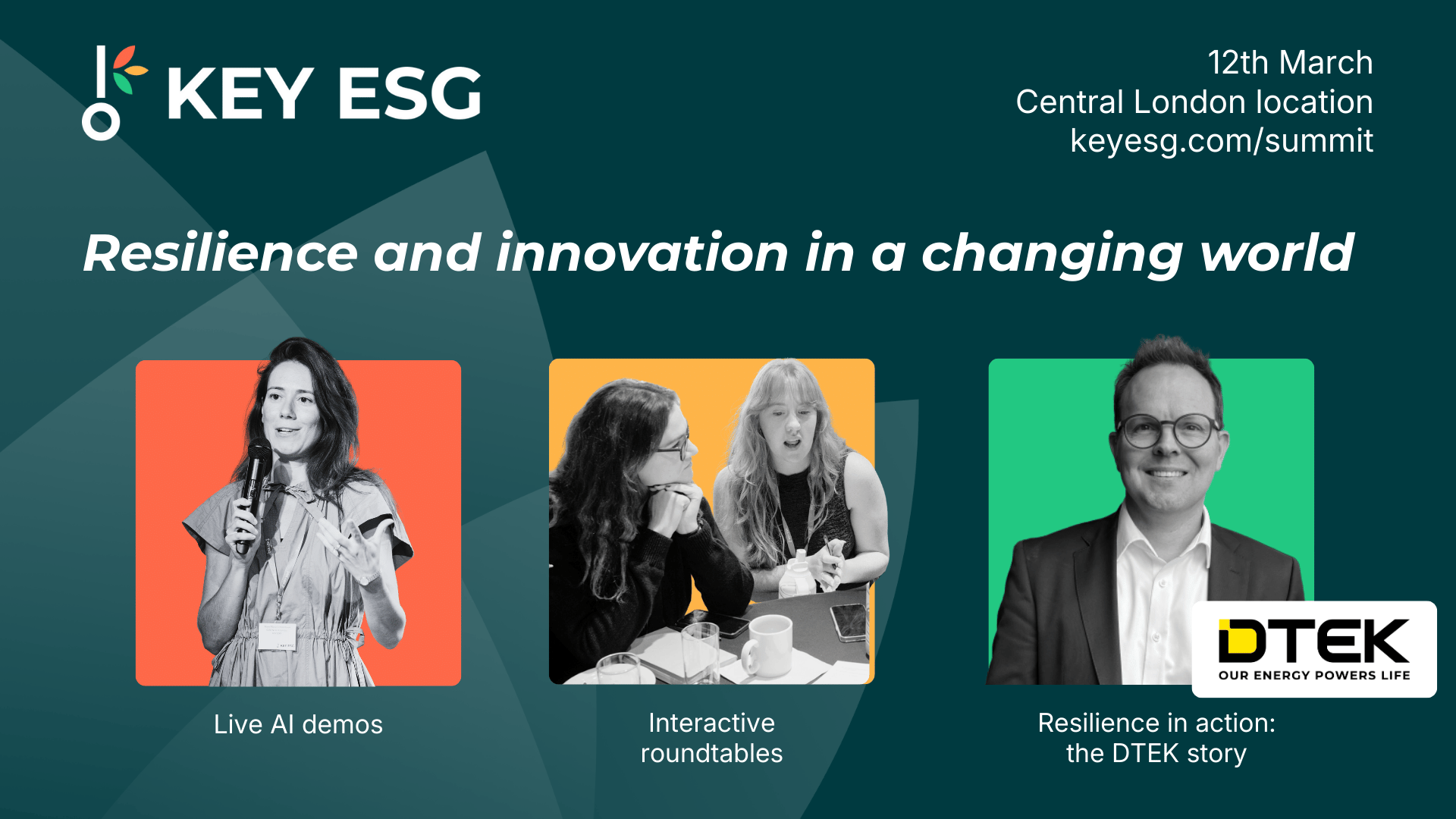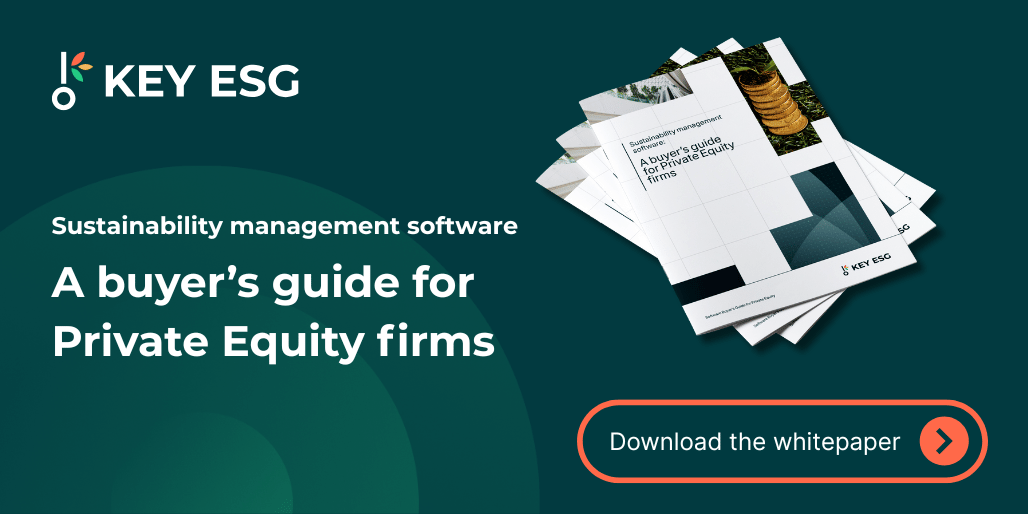How to proactively collaborate with LPs to drive better ESG outcomes
ESG disclosure requirements are becoming increasingly stringent, and limited partners (LPs) are asking for more and more ESG data to adhere to these demands. As ESG regulations and frameworks are still evolving, LPs are not always aligned on their ESG disclosure requirements, and general partners (GPs) have to deal with many different ESG data requests. GPs often struggle to keep up with these demands.
Good ESG performance management should balance the need for additional disclosure with the business realities on the ground. If GPs manage LP data requests more proactively, they gain access to more resources. They can then use these resources to drive better ESG outcomes.
In many cases, GPs end up spending more time reporting and collecting data than they do on managing and improving their ESG. This is frustrating, especially for GPs who acknowledge the immense value that ESG data can offer to drive value creation. The KEY ESG team has experienced these frustrations first hand, and we're passionate about providing solutions.
Good ESG management should balance satisfying stakeholder ESG disclosure demands as well as practical business realities. In recent years, both LPs and GPs have sought to address increasing ESG disclosure demands from their stakeholders. The team at KEY ESG often find that LPs feel that a lot of the GPs they invest in do not provide them with sufficient transparency on ESG performance. GPs, on the other hand, often comment that they feel inundated by LP ESG questionnaires that ask for data that is of little relevance to the actual ESG performance of their portfolio companies.
If GPs and LPS want to truly improve ESG management, they must optimise communication channels on ESG data from the moment they start working together.
How General Partners can optimise dialogue on ESG with their Limited Partners
There is always a direct line of communication between LPs and GPs. However, this communication becomes far more effective when expectations are well-managed. Establishing the expectations of private equity fund managers and partners across all levels allows partners to understand different stresses and pain points associated with reporting on ESG data at both a company and portfolio level.
Management can then ensure that everyone is focused on collecting the most appropriate information. This data can drive ESG improvement and provide a return on investment, rather than just tick the relevant boxes.
In this article, our experts set out a tried and tested method that you can apply to achieve this.
How General Partners can improve ESG reporting
Step 1: Involve investor relations
Ensure you include as many appropriate team members as possible.
Contact your investor relations (IR) colleagues and make sure that you're not making promises that your firm can’t deliver on when fundraising. Rather than waiting for LPs to dictate ESG demands, ESG leads and IR teams should collaborate to proactively set out what they propose to measure and why. LPs can then identify any gaps.
For more details, check out our article on "How IR can enhance your firm's ESG processes".
Step 2: Be proactive when discussing ESG with limited partners
Having too much ESG data that's not meaningful can be just as bad as having too little information. In both situations, LPs can't derive useful insights from the data presented to them, and they’re unable to improve their ESG metrics. In extreme cases, poor ESG reporting can even lead to considerable losses of resources, in terms of time, people, and money.
Be proactive and ask LPs WHY they want certain data points. Often it might be that they are simply “ticking a box” and can live without some of the data points they request. Let them know which ESG metrics you plan to report on and why those specific metrics are relevant. Invite them to share their thoughts on the metrics you've chosen, and be prepared to meet in the middle. Document your choices in sideletters.
The ESG Data Convergence Initiative is a good example of effective LP and GP collaboration. It sets out a common set of standards on what ESG data to collect and disclose. Read more about the EDCI here.
Step 3: Add ESG to the LPAC Agenda
The Limited Partner Advisory Committee (LPAC) can be a great sounding board for discussing ESG matters. Putting ESG on the formal agenda will create a space for discussion and will invite further debate. This allows GPs and LPs to reach a consensus on what metrics to collect.
Step 4: Question requests and remove unnecessary data
We're not advising GPs to question every individual data request. But if you're asked for something that you feel might be irrelevant, here is a list of some example questions you should ask:
- What do we need this information for?
- What are we going to do with the data?
- Have you derived any insights from this data in the past?
- What actions have you previously taken based on the insights gathered?
By asking thoughtful questions, you can demonstrate that you take the data demand seriously. Informed questions show that you’re trying to balance competing demands on resources and want to report on what really matters.
Framing these questions carefully is key. Make it clear to the LP that you're questioning their metrics in the interest of driving ESG improvement. Inform them that you're freeing up resources in order to focus on value creation. It is your obligation to be thorough, rather than to mindlessly report on metrics that might not be relevant to the business.
Usually, LPs are just checking a box. They don't really need the data. Some don't even look at it. Your questions will determine whether the investor is asking for what is required of them or what is nice to have.
Step 5: Remain fluid
Establishing which metrics to consider should be an ongoing process. Keep the lines of communication open, and reassess LPs' requests, as well as your ESG processes, regularly.
ESG regulations and disclosure requirements are evolving, but so are your businesses. Your firms may become exposed to new types of ESG risks. It's therefore important to periodically review the ESG data you are collecting and ask yourself why you need it.
Don't gather ESG data for the sake of continuity. Some metrics you measure may cease to be useful. So get rid. By the same token, new ones may need to be added in the future to update your firm's disclosures in line with new legislation. Some may be legal requirements, and others may represent the partner's personal ESG ambitions.
The benefits of focusing on the right ESG data
Open ESG discussions foster better collaboration between LPs and GPs. These conversations allow GPs to better understand LPs' aspirations for their portfolio companies, and vice versa.
Ultimately, the data given to LPs needs to come from somewhere. By managing expectations, you avoid many more data requests being directed towards your portfolio company. This saves time for everyone involved. Why not use this saved time to implement changes based on the insights gained from your relevant ESG data?
If you're a GP looking for LPs, this strategy reveals the thoughtfulness behind your asset management approach, setting you up as a corporate ESG leader.
For all things ESG, KEY ESG can help
There are a lot of steps to implement, and some of the stages we've presented can seem daunting. Whether you're new to ESG reporting or you're in a proactive limited partnership and are looking to improve your processes, KEY ESG can help.
Our software enables you to invest time intelligently and assess the metrics you really need to measure. Insights are contextualised based on where you are on your ESG journey, your industry type, and your ESG goals.
Our service allows you to:
- Structure and control your ESG content.
- Report on the metrics that matter.
- View all your ESG data in one place.
- Track progress.
- Form logical conclusions based on the data available.
- Optimise communication and collaboration between GPs and LPs.
Get in touch with a member of the team for further information, or request a free demo!
How to proactively collaborate with LPs to drive better ESG outcomes
ESG disclosure requirements are becoming increasingly stringent, and limited partners (LPs) are asking for more and more ESG data to adhere to these demands. As ESG regulations and frameworks are still evolving, LPs are not always aligned on their ESG disclosure requirements, and general partners (GPs) have to deal with many different ESG data requests. GPs often struggle to keep up with these demands.
Good ESG performance management should balance the need for additional disclosure with the business realities on the ground. If GPs manage LP data requests more proactively, they gain access to more resources. They can then use these resources to drive better ESG outcomes.
In many cases, GPs end up spending more time reporting and collecting data than they do on managing and improving their ESG. This is frustrating, especially for GPs who acknowledge the immense value that ESG data can offer to drive value creation. The KEY ESG team has experienced these frustrations first hand, and we're passionate about providing solutions.
Good ESG management should balance satisfying stakeholder ESG disclosure demands as well as practical business realities. In recent years, both LPs and GPs have sought to address increasing ESG disclosure demands from their stakeholders. The team at KEY ESG often find that LPs feel that a lot of the GPs they invest in do not provide them with sufficient transparency on ESG performance. GPs, on the other hand, often comment that they feel inundated by LP ESG questionnaires that ask for data that is of little relevance to the actual ESG performance of their portfolio companies.
If GPs and LPS want to truly improve ESG management, they must optimise communication channels on ESG data from the moment they start working together.
How General Partners can optimise dialogue on ESG with their Limited Partners
There is always a direct line of communication between LPs and GPs. However, this communication becomes far more effective when expectations are well-managed. Establishing the expectations of private equity fund managers and partners across all levels allows partners to understand different stresses and pain points associated with reporting on ESG data at both a company and portfolio level.
Management can then ensure that everyone is focused on collecting the most appropriate information. This data can drive ESG improvement and provide a return on investment, rather than just tick the relevant boxes.
In this article, our experts set out a tried and tested method that you can apply to achieve this.
How General Partners can improve ESG reporting
Step 1: Involve investor relations
Ensure you include as many appropriate team members as possible.
Contact your investor relations (IR) colleagues and make sure that you're not making promises that your firm can’t deliver on when fundraising. Rather than waiting for LPs to dictate ESG demands, ESG leads and IR teams should collaborate to proactively set out what they propose to measure and why. LPs can then identify any gaps.
For more details, check out our article on "How IR can enhance your firm's ESG processes".
Step 2: Be proactive when discussing ESG with limited partners
Having too much ESG data that's not meaningful can be just as bad as having too little information. In both situations, LPs can't derive useful insights from the data presented to them, and they’re unable to improve their ESG metrics. In extreme cases, poor ESG reporting can even lead to considerable losses of resources, in terms of time, people, and money.
Be proactive and ask LPs WHY they want certain data points. Often it might be that they are simply “ticking a box” and can live without some of the data points they request. Let them know which ESG metrics you plan to report on and why those specific metrics are relevant. Invite them to share their thoughts on the metrics you've chosen, and be prepared to meet in the middle. Document your choices in sideletters.
The ESG Data Convergence Initiative is a good example of effective LP and GP collaboration. It sets out a common set of standards on what ESG data to collect and disclose. Read more about the EDCI here.
Step 3: Add ESG to the LPAC Agenda
The Limited Partner Advisory Committee (LPAC) can be a great sounding board for discussing ESG matters. Putting ESG on the formal agenda will create a space for discussion and will invite further debate. This allows GPs and LPs to reach a consensus on what metrics to collect.
Step 4: Question requests and remove unnecessary data
We're not advising GPs to question every individual data request. But if you're asked for something that you feel might be irrelevant, here is a list of some example questions you should ask:
- What do we need this information for?
- What are we going to do with the data?
- Have you derived any insights from this data in the past?
- What actions have you previously taken based on the insights gathered?
By asking thoughtful questions, you can demonstrate that you take the data demand seriously. Informed questions show that you’re trying to balance competing demands on resources and want to report on what really matters.
Framing these questions carefully is key. Make it clear to the LP that you're questioning their metrics in the interest of driving ESG improvement. Inform them that you're freeing up resources in order to focus on value creation. It is your obligation to be thorough, rather than to mindlessly report on metrics that might not be relevant to the business.
Usually, LPs are just checking a box. They don't really need the data. Some don't even look at it. Your questions will determine whether the investor is asking for what is required of them or what is nice to have.
Step 5: Remain fluid
Establishing which metrics to consider should be an ongoing process. Keep the lines of communication open, and reassess LPs' requests, as well as your ESG processes, regularly.
ESG regulations and disclosure requirements are evolving, but so are your businesses. Your firms may become exposed to new types of ESG risks. It's therefore important to periodically review the ESG data you are collecting and ask yourself why you need it.
Don't gather ESG data for the sake of continuity. Some metrics you measure may cease to be useful. So get rid. By the same token, new ones may need to be added in the future to update your firm's disclosures in line with new legislation. Some may be legal requirements, and others may represent the partner's personal ESG ambitions.
The benefits of focusing on the right ESG data
Open ESG discussions foster better collaboration between LPs and GPs. These conversations allow GPs to better understand LPs' aspirations for their portfolio companies, and vice versa.
Ultimately, the data given to LPs needs to come from somewhere. By managing expectations, you avoid many more data requests being directed towards your portfolio company. This saves time for everyone involved. Why not use this saved time to implement changes based on the insights gained from your relevant ESG data?
If you're a GP looking for LPs, this strategy reveals the thoughtfulness behind your asset management approach, setting you up as a corporate ESG leader.
For all things ESG, KEY ESG can help
There are a lot of steps to implement, and some of the stages we've presented can seem daunting. Whether you're new to ESG reporting or you're in a proactive limited partnership and are looking to improve your processes, KEY ESG can help.
Our software enables you to invest time intelligently and assess the metrics you really need to measure. Insights are contextualised based on where you are on your ESG journey, your industry type, and your ESG goals.
Our service allows you to:
- Structure and control your ESG content.
- Report on the metrics that matter.
- View all your ESG data in one place.
- Track progress.
- Form logical conclusions based on the data available.
- Optimise communication and collaboration between GPs and LPs.
Get in touch with a member of the team for further information, or request a free demo!


.avif)



